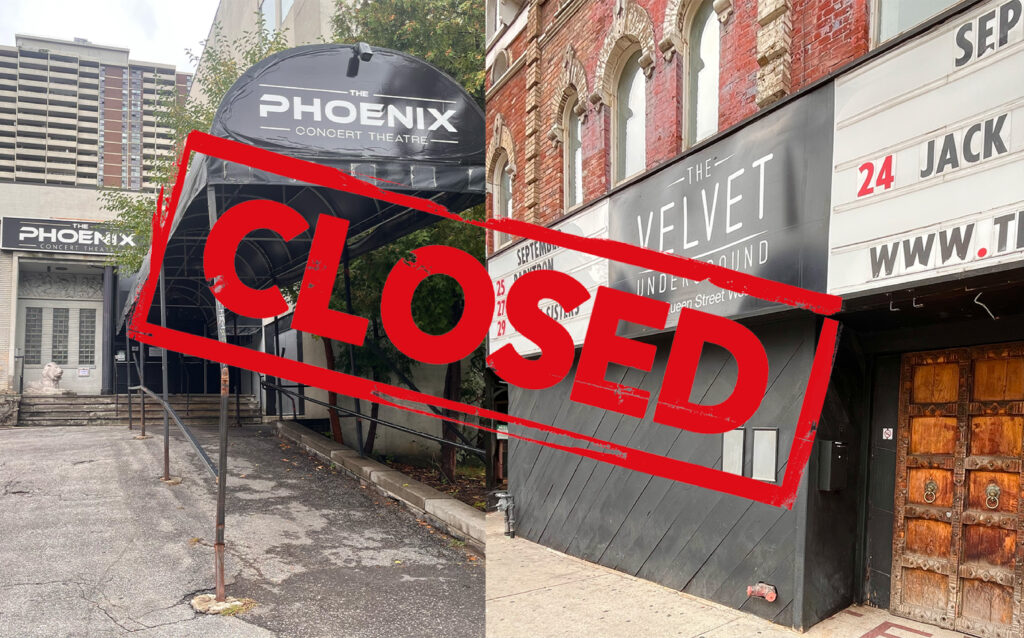
Toronto has long touted itself as Canada’s largest music hub, yet opportunities for artists to perform across the city continue to dwindle with the closure of historic music establishments.
Now, many of them, including The Phoenix Concert Theatre and The Velvet Underground, face shutdowns and as major festivals and stadium-sized venues dominate the scene, grassroots spaces that host local artists in more intimate settings struggle to survive.
These spaces add to a growing list of venues that have permanently ceased operations within recent years, including The Dakota Tavern, The Matador, The Hoxton, and The Orbit Room.
According to a Wavelength Music report, COVID-19 only worsened existing challenges, pushing many smaller venues to the brink. The 2023 report is “a collaboration between the University of Toronto School of Cities and Wavelength Music,” and it found that in Toronto, 13 per cent of venues permanently closed, and 75 per cent of respondents to their survey said they considered local music venues endangered or threatened.
“Playing at these venues at a young age helped me get experience, establish myself as a player, and try to make a name in the scene,” said bassist Luke Vasilakos. For Vasilakos, breaking into Toronto’s music scene was a family affair. His father, also a musician, helped open doors by introducing him to other people in the industry. Those connections soon led to gigs at smaller and mid-sized venues, including The Rockpile and The Antler Room.
Since then, Vasilakos has opened for acts such as Foreigner, The Joe Perry Project, Greta Van Fleet, John 5, and more.
Vasilakos emphasizes the competitiveness of Toronto’s music scene, but he sees that rivalry as part of what makes small and mid-sized spaces all the more essential.
As an emerging artist trying to pursue a full-time music career, he reflects on his time at these venues. Although he hasn’t personally lost gig opportunities to venue closures, the prospect of fewer stages presents a concern.
“When I first found out about The Phoenix initially closing down, I was pretty upset because I’d only played there once,” he recalled.
Vasilakos says he sees these venues as important stepping stones for mid-size bands, providing a bridge between grassroots shows and the city’s larger stages. He acknowledges that live music will endure, but the landscape is changing.
“I think there’s always going to be live music—people love going to see shows—but [the scene] will probably get a little smaller,” he said. “It’s going to take more for bands to cut their teeth now. Everybody’s fighting for scraps.”
According to experts like Charlie Wall-Andrews, Toronto’s affordability crisis is displacing artists and shuttering rehearsal spaces, studios, and clubs altogether, creating a bottleneck for up-and-coming talent.
Wall-Andrews is a Canadian academic and music industry executive; she describes the issue as threefold.
“Culturally, we risk erasing the very environments that foster diversity, innovation, and homegrown talent. Socially, we lose gathering places that connect communities across backgrounds, generations, and genres. Economically, the city risks undermining one of its fastest-growing sectors by making it harder for artists to live, work, and contribute locally,” she wrote in an email.
Wall-Andrews warns that the increase in closures signals a troubling power shift, with developers and real estate interests playing a growing role in shaping urban culture at the expense of artists and communities.
She wrote that she believes the live music scene depends on accessible, experimental spaces, but when market forces determine what survives, cultural expression risks being reduced to whatever is most profitable. This, she says, raises urgent questions about whether urban culture should be community-led or developer-driven.
“These spaces aren’t just entertainment venues; they’re part of Toronto’s cultural infrastructure. If we let them disappear, we jeopardize both our cultural identity and our global competitiveness,” she added.
Despite their role in the community, the fate of small music venues is frequently determined by finances, according to Canadian radio broadcaster and music writer Alan Cross.
“It’s a complex dance, but in the end, money talks. No one wants to operate a venue at a loss and passion for music can only take you so far,” he said in an email.
Cross underscores the need to safeguard Toronto’s music spaces against financial pressure and commercial interests.
“Without art and artists of any kind, a city isn’t worth living in, especially in the downtown area. The City of Toronto knows this, which is why they have a Music Office and are exploring places to designate as entertainment districts,” he wrote.
“The soul of a city are its artists. If we don’t find a way to protect them, we’ll end up with a pretty drab existence.”
Jenna Gitlin is a fourth-year journalism student and reporter for On the Record, Fall 2025
No AI tools were used in the production of this piece.

